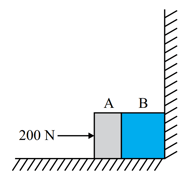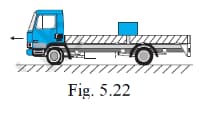EXERCISES
Jharkhand Board Physics Solutions for EXERCISES
Simple step-by-step solutions to EXERCISES questions of Laws of Motion from PHYSICS PART 1 TEXTBOOK FOR CLASS XI. Also get 3D topic explainers, cheat sheets, and unlimited doubts solving on EMBIBE.
Questions from EXERCISES with Hints & Solutions
Two bodies and of masses and in contact with each other rest on a table against a rigid wall (Fig. ). The coefficient of friction between the bodies and the table is . A force of is applied horizontally to . What happens when the wall is removed? Does the answer to (b) change, when the bodies are in motion? Ignore the difference between and .

A block of mass is placed on a long trolley. The coefficient of static friction between the block and the trolley is . The trolley accelerates from rest with for and then moves with uniform velocity. Discuss the motion of the block as viewed by a stationary observer on the ground.
A block of mass is placed on a long trolley. The coefficient of static friction between the block and the trolley is . The trolley accelerates from rest with for and then moves with uniform velocity. Discuss the motion of the block as viewed by an observer is moving with the trolley.
The rear side of a truck is open, and a box of mass is placed away from the open end, as shown in Fig. . The coefficient of friction between the box and the surface below it is . On a straight road, the truck starts from rest and accelerates with . At what distance from the starting point, does the box fall off the truck? (Ignore the size of the box and take )

A disc revolves with a speed of and has a radius of . Two coins are placed at and away from the centre of the record. If the co-efficient of friction between the coins and the record is , which of the coins will revolve with the record? (Take )
You may have seen in a circus a motorcyclist driving in vertical loops inside a ‘death-well.’ (a hollow spherical chamber with holes, so the spectators can watch from outside). Explain clearly why the motorcyclist does not drop down when he is at the uppermost point, with no support from below. What is the minimum speed required at the uppermost position to perform a vertical loop if the radius of the chamber is ?
A man stands in contact against the inner wall of a hollow cylindrical drum of radius rotating about its vertical axis with . The coefficient of friction between the wall and his clothing is . What is the minimum rotational speed of the cylinder to enable the man to remain stuck to the wall (without falling) when the floor is suddenly removed?
A thin circular loop of radius rotates about its vertical diameter with an angular frequency . Show that a small bead on the wire loop remains at its lowermost point for . What is the angle made by the radius vector joining the centre to the bead with the vertically downward direction for ? Neglect friction.
